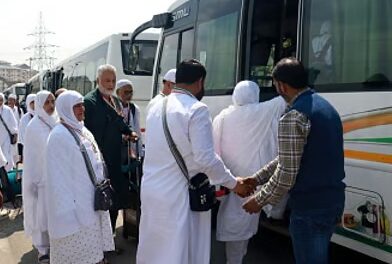
Egypt to End Overland Hajj Bus Services Starting in 2026
- Interfaith
- July 31, 2025
- No Comment
Report by “Safarti Tarjuman” International News Desk
Cairo – Egypt has announced it will permanently discontinue Hajj pilgrimages by bus beginning in 2026, following Saudi Arabia’s new transport directives that reserve all in-Kingdom pilgrimage logistics for Saudi-operated vehicles only.
The decision, which marks a significant shift in Egypt’s long-standing Hajj travel procedures, comes in response to Saudi Arabia’s updated Hajj transport policy, which prohibits foreign buses from operating within its borders during the annual pilgrimage.
According to Hamza Anaby, a senior official with the Egyptian Federation of Tourist Chambers, the development marks the biggest overhaul in decades of Egypt’s Hajj logistics planning.
“Saudi Arabia will exclusively manage the internal movement of pilgrims,” Anaby confirmed. “This means that Egyptian buses will no longer be used on Saudi soil during Hajj.”
In response, Egypt is restructuring its entire Hajj travel framework. All future packages will now emphasize flights and sea routes, with new pricing models to accommodate the higher costs of compliance with Saudi transport reforms.
The Ministry of Religious Endowments and the Ministry of Tourism are currently working closely with private tour operators to develop affordable and high-quality travel options.
Official Hajj travel guidelines for 2026, including details on flight schedules, port departure points, and in-Kingdom logistics, are expected to be issued shortly.
Pilgrims who had previously registered for overland Hajj trips will be rebooked through Cairo and Alexandria international airports or designated Egyptian seaports, depending on availability and budget.
The shift is part of Saudi Arabia’s Vision 2030 initiative, which aims to modernize and streamline the Hajj experience through safer, more efficient, and centrally managed transportation systems.
Saudi officials believe that by restricting pilgrim transit to nationally operated fleets, they can enhance safety, reduce logistical bottlenecks, and ensure a uniform experience for all pilgrims during one of Islam’s most sacred journeys.
Thank you for reading! For comprehensive news coverage and exclusive stories, visit SafartiTarjuman.com




